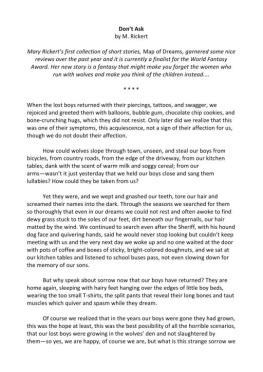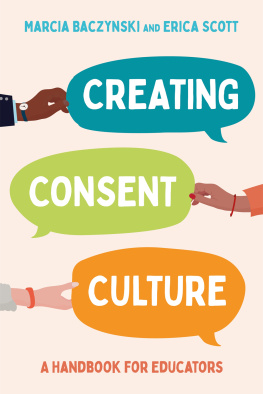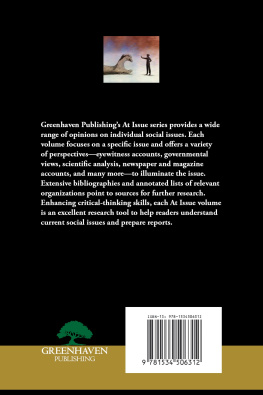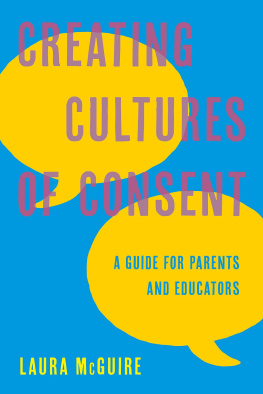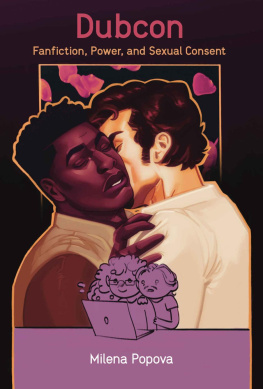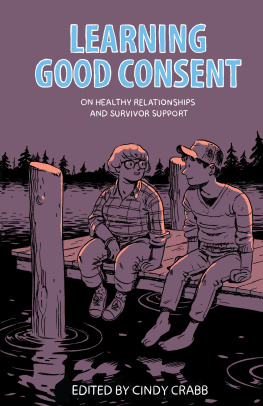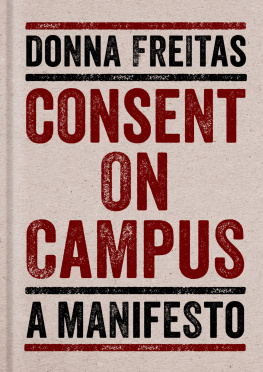Dont Askby M. Rickert
Mary Rickerts first collection of short stories, Map of Dreams, garnered some nicereviews over the past year and it is currently a finalist for the World FantasyAward. Her new story is a fantasy that might make you forget the women whorun with wolves and make you think of the children instead....
* * * *
When the lost boys returned with their piercings, tattoos, and swagger, we rejoiced and greeted them with balloons, bubble gum, chocolate chip cookies, and bone-crunching hugs, which they did not resist. Only later did we realize that this was one of their symptoms, this acquiescence, not a sign of their affection for us, though we do not doubt their affection.
How could wolves slope through town, unseen, and steal our boys from bicycles, from country roads, from the edge of the driveway, from our kitchen tables, dank with the scent of warm milk and soggy cereal; from our armswasnt it just yesterday that we held our boys close and sang them lullabies? How could they be taken from us?
Yet they were, and we wept and gnashed our teeth, tore our hair and screamed their names into the dark. Through the seasons we searched for them so thoroughly that even in our dreams we could not rest and often awoke to find dewy grass stuck to the soles of our feet, dirt beneath our fingernails, our hair matted by the wind. We continued to search even after the Sheriff, with his hound dog face and quivering hands, said he would never stop looking but couldnt keep meeting with us and the very next day we woke up and no one waited at the door with pots of coffee and boxes of sticky, bright-colored doughnuts, and we sat at our kitchen tables and listened to school buses pass, not even slowing down for the memory of our sons.
But why speak about sorrow now that our boys have returned? They are home again, sleeping with hairy feet hanging over the edges of little boy beds, wearing the too small T-shirts, the split pants that reveal their long bones and taut muscles which quiver and spasm while they dream.
Of course we realized that in the years our boys were gone they had grown, this was the hope at least, this was the best possibility of all the horrible scenarios, that our lost boys were growing in the wolves den and not slaughtered by themso yes, we are happy, of course we are, but what is this strange sorrow we discover in the dark? Why cant we stop weeping during this, the happiest of times?
* * * *
Years before our boys returned there was the return of the famous lost boy, stolen from the end of his driveway, the wheels of his blue bicycle still spinning when his mother went to the door to call him in for dinner and saw the bike there but did not immediately comprehend it as a sign of catastrophe. He was missing for eight years, and was a hero for a while, until he started committing petty crimes in the neighborhood.
The famous lost boy, a man now, explains that he has been observing our behavior and the behavior of our sons. We cannot help but feel squeamish about the whole thing, we are uncomfortable with the notion that, after everything that happened, we have been studied and observed and did not know it. We discuss this in whispers in the high school auditorium, where the famous lost boy has come to speak. The therapists have their theories but we assume only one person has the truth and we are eager to hear what he can tell us about all our suffering, because, we say, nodding our heads and hugging ourselves in the cold auditorium, this happened to all of us.
No, the famous lost boy (now a grown man with long, stringy hair) says.
It didnt.
We have been advised by therapists and counselors, experts beyond the meager fourth grade education of the famous lost boy (by the time he came back, he was too angry and unruly for school) not to ask what happened. They will tell you when they are ready, the experts say.
We ask them if they want maple syrup for their pancakes, what show theyd like to watch, what games theyd like to play. We spoil them and expect them to revel in it, the way they did before they were taken, but oddly, in spite of all theyve been through, and the horrors they have endured, they behave as though our servitude and their eminence is a given. Yet, sometimes we ask a question, so innocent, chocolate chip or peanut butter? which they respond to with confusion, frowning as if trying to guess a right answer, or as though unfamiliar with the terms. Other times they bark or growl like angry dogs being taunted, but it passes so quickly we are sure its been imagined.
* * * *
The famous lost boy wants us to give him our sons. You can visit whenever, he says.
What is he, crazy? What does he think we are?
You dont understand them. Nobody does. Except me.
We are not sure if this is true. The part about him understanding them. Perhaps. We know that we dont. The therapists say, Give it time. Dont ask.
We ask them if they want meatloaf or roast chicken and they stare at us as if we have spoken Urdu. We show them photographs of the relatives who died while they were gone and find it disturbing that they nod, as if they understand, but show no grief. We stock the refrigerator with soda, though we know they should drink juice, and Gatorade, remembering how they used to gulp it down in great noisy swallows (and we scolded them for drinking right out of the bottle) after games of little league and soccer, though now they are happy to sit, listlessly, in front of the computer for hours, often wandering the house in the middle of the night. We ask them if their beds are comfortable enough, are they warm enough, are they cool enough, but we never ask them what happened because the therapists have told us not to. When we explain this to the famous lost boy (though why do we feel we have to explain ourselves to him? He cant even hold down a job at McDonalds) he says, You dont ask, because you dont want to know.
We hate the famous lost boy, he sneers and ridicules and we do not want our sons to turn out like him. He is not a nice man. We just want him to go away, but he wont. Notoriously reclusive for years, he is now, suddenly, everywhere. Walking down Main Street. Hanging out at the coffee shops. Standing on the street corner, smoking. We are sorry to see that our boys seem to like him. Sometimes we find them, running together, like a wild pack. We call them home and they come back to us panting, tongues hanging out. They collapse on the couch or the floor and when they fall asleep they twitch and moan, cry and bark. We dont know what they dream about, though we think, often, they dream of running.
They run all the time now. In the morning they run down the stairs and around the kitchen table. We tell them to sit, or calm down, but it doesnt really work. Sometimes we open the door and they tear into the backyard. We have erected fences but they try to dig out, leaving potholes where tulips and tiger lilies and roses blossomed through all those years of our grief. We stand at the window wondering at the amazing fact of their tenacity in trying to escape us when (and this is public knowledge, much discussed and debated by newscasters and talk show hosts in those first heady weeks after they were found) they never tried to escape their beasts.
Sometimes we feel our neck hairs tingle and we find the lost boys staring at us like animals in a cage, frightened and wary, then they smile, and we smile in return, understanding that they will have these bad memories, these moments of fear.
* * * *
The famous lost boy sighs, and right there, in the high school auditorium, lights a cigarette, which Hymral Waller, the school board president, rushes to tell him must be extinguished. What? the word sounds angry in the bite of microphone. This? Hymrals words drift from the floor, hollow, balloon-like,
Next page 
